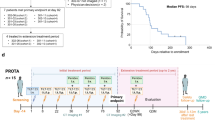Play all audios:

Introduction: Patients with recurrent ovarian cancer were treated with a replication-deficient recombinant adenovirus containing the herpes simplex virus thymidine kinase gene administered
intraperitoneally (i.p.) followed by administration of an anti-herpetic prodrug and topotecan.
Materials and Methods: A total of 10 patients with stage IIIc epithelial ovarian cancer underwent secondary debulking to ≤0.5 cm residual tumor. Patients with normal i.p. flow received i.p.
delivery of adenovirus. Two patients each were treated on dose level 1 (2 × 1010 vector particles (VP)), dose level 2 (2 × 1011 VP), and dose level 3 (2 × 1012 VP); four patients were
treated on dose level 4 (2 × 1013 VP). Acyclovir and topotecan were started 24 hours after vector delivery.
Results: No patient treated at any dose level incurred unanticipated toxic effects, and all side effects resolved. The most common adverse event was myelosuppression: grade 3 or 4
thrombocytopenia with grade 2–4 anemia in three patients and grade 3 or 4 neutropenia in eight patients. Three patients developed thrombocytosis and three patients had a mild elevation of
serum glutamic pyruvic transaminase/alanine aminotransferase. Temperature elevations that were not associated with detectable infection occurred in two patients.
Discussion: I.p. delivery of adenoviral vector with concomitant topotecan chemotherapy was well tolerated without significant lasting toxicities. Side effects were independent of the dose of
adenoviral vector.
Anyone you share the following link with will be able to read this content:
